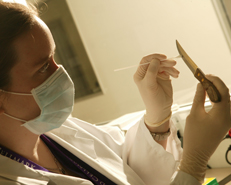Dispatch from Dallas: The growing impact of ultra-sensitive DNA testing
07.10.08

By Cassie Johnson, Forensic Supervisor at Orchid Cellmark, DNA Laboratory
DNA testing is the most powerful type of identity testing available, and it is used for many different purposes: to establish paternity and lineage, or in criminal investigations. With DNA testing, we can uniquely identify every person in the world, unless that person has an identical twin.
Thanks to major improvements in DNA testing technology over the last few years, the tiniest shred of biological evidence can assist in almost any type of crime. Most of the criminal cases we’ve traditionally worked on have been homicides and sexual assaults, but DNA testing is now being used around the world in nonviolent crimes such as burglaries. We could test a pinpoint of biological evidence, whether it’s blood, semen, saliva, or skin cells, and develop a DNA profile. The potential sources of DNA are almost limitless. As DNA testing has progressed, it has become substantially more sensitive, and it works increasingly well on compromised or degraded samples. We’re now able to generate a DNA profile from a sample in which testing would previously never have been attempted.
The criminal justice system uses four main types of DNA testing: STR, Y-STR, mini-STR, and mitochondrial:
• STR testing has been around the longest and is the type of testing most commonly used by crime labs, defense attorneys and prosecutors.
• Mitochondrial DNA testing is often used to generate a DNA profile from hair, bones, or teeth, and is a specialized type of testing that has been used since the mid-1990s.
• The Y-STR test uses the same technologies and principles as STR testing. However, Y-STR testing only looks at areas that are on the Y chromosome, which makes it male-specific. In our experience, it is also more sensitive than STR testing, so we may be able to obtain a profile with less starting material.
• Mini-STR is the newest form of DNA testing and is especially useful on samples that are highly degraded. It is perhaps even more sensitive than STR or Y-STR testing. This year,
Rickey Johnson
became the first person to be proven innocent through mini-STR DNA testing.
In every case, our job is to develop profiles from evidence regardless of the eventual outcome. We have conducted testing in the cases of several Innocence Project clients, and these are cases that truly demonstrate the potential of DNA testing to change people’s lives. In
James Waller
’s case, a state lab attempted to conduct DNA testing several years earlier and couldn’t get a result—but the process of testing used up the evidence, which is not uncommon.
We didn’t have any of the original evidence like the rape kit or the bedsheet to go back and test. The only thing that was left over for testing was a liquid “extract,” meaning a leftover lab sample of the evidence. Fortunately, the state lab preserved the liquid extract and made it available to us for Y-STR testing. We were able to obtain a DNA profile from the extract; it did not match his profile and therefore showed that he could not have contributed the sample. Something similar happened in Scott Fappiano’s case. In that instance, it was Orchid Cellmark that had retained the extracts from the early 1990s. Those extracts ultimately led to Mr. Fappiano’s freedom.
Orchid Cellmark is very proud to be able to donate its expertise in DNA testing to the Innocence Project, which continuously fights for those who have been wrongfully convicted. Working on these post-conviction cases reminds us how powerful DNA testing can be, whether it be in solving a cold case or exonerating the wrongfully accused.
Orchid Cellmark
, based in New Jersey with laboratories all over the country – including Johnson’s lab in Dallas, has conducted DNA testing in Innocence Project cases for years and provides some testing pro bono. Their laboratories have conducted testing that exonerated several Innocence Project clients in recent years. In many of these cases, Orchid Cellmark’s testing has also helped identify the true perpetrators of crimes for which innocent people were convicted.

Leave a Reply
Thank you for visiting us. You can learn more about how we consider cases here. Please avoid sharing any personal information in the comments below and join us in making this a hate-speech free and safe space for everyone.